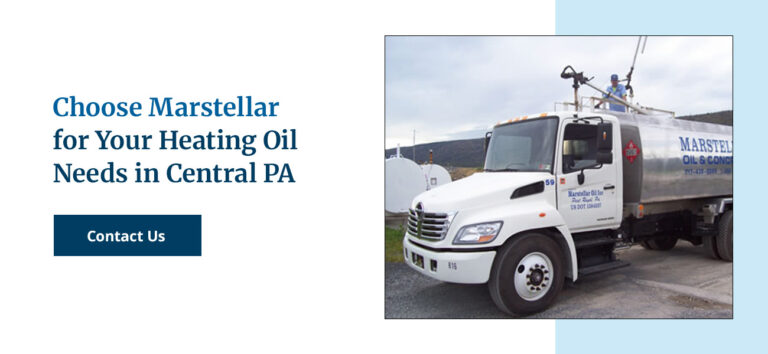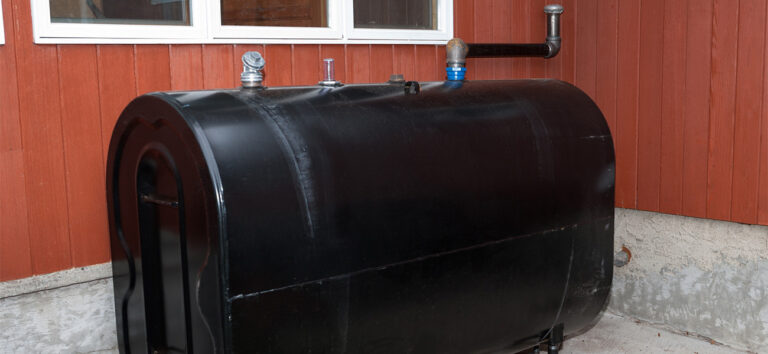
If you rely on furnace oil to stay warm in winter, it’s tempting to fill the tank, buy some extra to keep on hand and forget about it. However, you don’t want to waste money on surplus oil that goes bad. If you buy heating oil soon before fall or winter hits, you probably will not need to worry about its shelf life. As for any oil left over after the cold weather ends, that depends.
Does Heating Oil Have a Shelf Life?
Yes, heating oil has a shelf life. So, how long is heating oil good for? By most accounts, your heating oil should last anywhere from 18 to 24 months if stored properly. If you just bought a fresh oil supply, it should last you through this cold season and maybe the next, but you may not want to keep your hopes up beyond that.
Why Does Heating Oil Go Bad?
Several factors contribute to heating oil degradation, but most of it comes down to the natural bacterial action in the tank and any contamination from water, rust, paint or sludge that finds its way into the tank.
Oil naturally contains bacteria, so you cannot completely prevent this degradation, but you can slow the process. While we usually don’t think of water as a contaminant, water is a significant threat to heating oil longevity. The minerals and chemicals in water react poorly with your heating oil. Even if you remove all the water from your tank, the minerals and chemicals may remain, ready to degrade your heating oil.
Contaminates like rust, sludge or paint in your oil tank will also cause your oil to degrade faster. Additionally, these contaminants will lead to a buildup of sediment that shortens your heating oil’s shelf life.
Your tank’s condition and temperature can also impact your heating oil. Old or underground tanks are more likely to contaminate your heating oil. Furthermore, heating oil can change consistency if exposed to freezing temperatures. The oil will become gel-like and can clog your heating system’s lines and filters, ultimately damaging your furnace.
Overall, improper storage and lack of maintenance will adversely affect your heating oil and cause it to go bad much faster.
What Can You Do to Stop Your Heating Oil From Going Bad?
With proper storage and maintenance, you can prevent your oil from going bad. However, even with outstanding care, your heating oil is unlikely to exceed its two-year shelf life. These preventive efforts help your oil reach its maximum service life. The following steps can preserve your heating oil, though eventual breakdown is unavoidable.
Use Fuel Additives
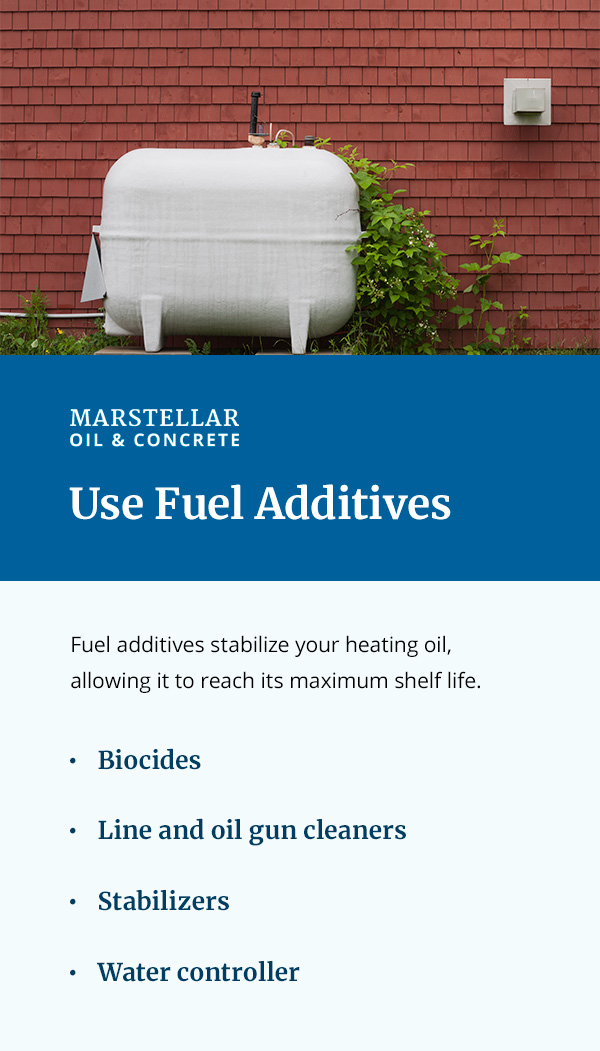
Fuel additives stabilize your heating oil, allowing it to reach its maximum shelf life.
- Biocides: This additive slows and treats microbial growth within your tank.
- Line and oil gun cleaners: This additive keeps the line that moves your oil from the tank to the burners clean and efficient. It will also clean any sediment or sludge buildup on the bottom of the tank.
- Stabilizers: As the name suggests, fuel stabilizers protect heating oil from outside factors such as antioxidants.
- Water controller: As you know, water can contaminate your heating oil. Protect your oil with a water controller additive that will control and handle any condensation inside the tank.
Apply these additives every time you refill your tank. Additives applied later on will not extend your heating oil’s shelf life. Once your oil begins to degrade, you cannot do or add anything to restore it to its healthy state. That’s why it’s so crucial to include additives from the get-go.
Clean Your Tank
A clean tank with no significant defects can help you enjoy a longer fuel life. Since contaminants like paint, water, gasoline and motor oil can all affect your heating oil’s service life, it is paramount to only use the tank for heating oil. Tanks that held other materials will cause your heating oil to degrade much faster. The contaminants will remain even if you remove all other materials, significantly decreasing the oil’s shelf life.
Tank inspection is another way to keep your heating oil from going bad. If your tank becomes corroded or begins leaking, outside contaminants can infect your oil. While a leaking tank will ruin your heating oil, this issue is also a health and environmental hazard.
Have Routine Inspections
Routine inspections can help catch this issue before it becomes too serious or dangerous. Professional inspections can also catch other potential problems you may not even notice. For example, buried oil tanks might have contaminated the surrounding soil, leading to future oil degradation problems. Professionals can run tests to determine how toxic the soil is and develop a protection plan if needed. Overall, having a trained eye inspect the area is the best way to ensure safe and appropriate oil storage.
Buy Smaller Oil Batches
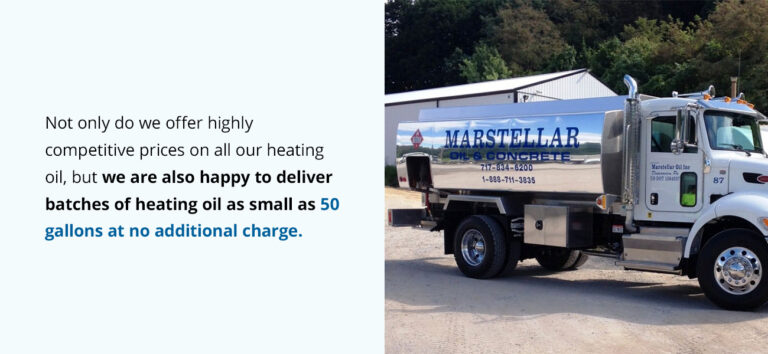
If you’re worried about getting stuck with excess fuel that goes bad and wasting money, one solution is to buy less oil. Unfortunately, most distributors don’t sell oil in small batches. They’ll want you to get 100 gallons or more, and you might even find yourself paying a premium for that amount.
However, Marstellar Oil and Concrete provides the perfect solution for customers throughout Central Pennsylvania. Not only do we offer highly competitive prices on all our heating oil, but we are also happy to deliver batches of heating oil as small as 50 gallons at no additional charge. If you live in Cumberland, Dauphin, Juniata, northern York, Perry, southern Snyder, western Lebanon or western Lancaster counties, this is the way to go. If you run out, you can always order more. It’s easy to place a quick order online and have your oil delivered in virtually no time at all.
How to Tell if Heating Oil Has Gone Bad
If you suspect your heating oil may have gone bad, there are a few telltale signs to look for. First, physical leaking around the tank or at any pipe joints will indicate a severe problem. If your oil tank has visible leaking, you’ll want to call a professional to look at your tank and determine the next steps.
Another sign your oil has gone bad is rust forming on the tank’s exterior. While external rust does not guarantee internal rust, you’ll want a professional to inspect your tank to be safe. Internal rust will contaminate your heating oil and break it down.
Heating Oil Tank Problems
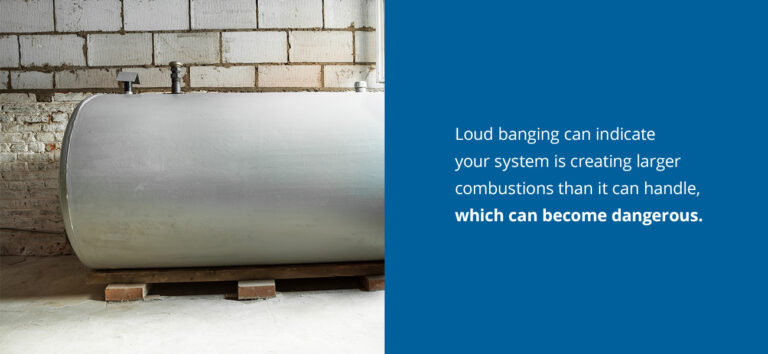
Other signs your heating oil or tank is not working properly include loud banging, smoke or soot and unusual or strong smells when the system is in use. When your system is running, you’ll hear noises, but they should sound like a soft roar. Loud banging can indicate your system is creating larger combustions than it can handle, which can become dangerous. If you hear any sounds coming from your oil tank or furnace, call a professional immediately.
Properly working systems will have a slight scent, especially upon startup. However, if you begin to smell a strong odor, or the smells emitted from your system are different than usual, you’ll want to contact a professional to check that your system is safe and working properly.
Additionally, if your system is visibly smoking or there is soot around the area, you’ll need an immediate technical inspection — especially if the smoke or soot occurs with an unusual odor.
These tank or system issues can occur even with brand-new heating oil. However, it’s more likely your oil has started to go bad once these problems emerge.
What Can You Do With Old Heating Oil?
Oil companies can remove your leftover or old heating oil. If your oil is still in good condition, your oil company will take it somewhere else so it doesn’t go to waste. However, you’ll likely seek removal services for your expired oil. Luckily, it’s possible to recycle old heating oil into a new base oil. Re-refined oil protects the environment from pollution and preserves the nonrenewable resource.
The extensive re-refining process removes all contaminants from your old oil to create a new, environmentally friendly and safe base oil. From there, additives transform the base oil into various lubricants, such as transmission fluid, grease or motor oil.
If you’re unsure what to do with your old heating oil, call a professional oil company for guidance.
Choose Marstellar for Your Heating Oil Needs in Central PA
It’s crucial to have safe and reliable heating oil to keep your family warm. That’s why we’ve made it easy to order heating oil online. Plus, we offer quick home delivery!
At Marstellar, we also offer the option for small orders. You no longer have to order large quantities of heating oil that will ultimately go bad before you can ever use it. With small heating oil orders, you can top off your current tank or get the perfect amount of oil for your needs.
To place an order or learn more about our services, contact Marstellar Oil and Concrete online today.



